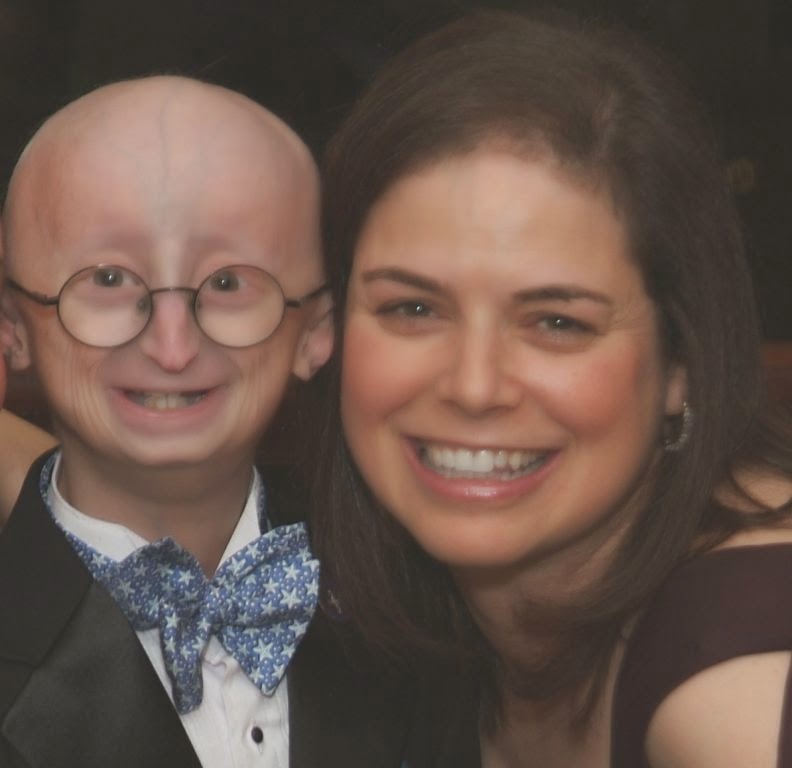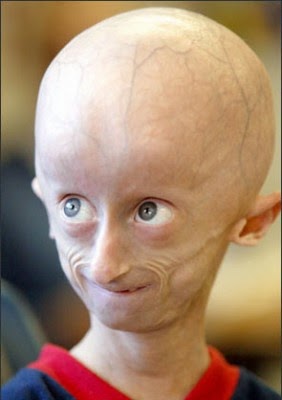The living statue syndrome (or Stone man syndrome)
Fibrodysplasia Ossificans Progressiva (FOP) is one of the rarest, painful and most disabling genetic conditions in which bones form in muscles, tendons, ligaments and other connective tissues. These bones develop across joints thus restricting movement and forming a second skeleton. The body thus looks like a living statue. Unfortunately, there is no effective treatment for this condition. Injuries and surgeries can further deteriorate the condition. This genetic disease doesn’t have ethnic, racial, or gender patterns and has been found to affect just one in two million people.
Jeannie Peeper became aware of her disorder when she was 8. Her left wrist had locked in a backwards position as a new bone had grown in her arm. Jeannie’s doctors took a muscle biopsy from her left forearm. That caused another bone growth that had frozen the joint. Over the next decade, she grew more bones across her back disfiguring her, her right elbow locking, and her left hip freezing. Once she hit her hip on the corner of the table. It caused another bone growth. This time her right hip froze. Since then she has been in a wheelchair.
Fish Odour Syndrome – Trimethylaminuria

 |
 |
Fibrodysplasia Ossificans Progressiva (FOP) is one of the rarest, painful and most disabling genetic conditions in which bones form in muscles, tendons, ligaments and other connective tissues. These bones develop across joints thus restricting movement and forming a second skeleton. The body thus looks like a living statue. Unfortunately, there is no effective treatment for this condition. Injuries and surgeries can further deteriorate the condition. This genetic disease doesn’t have ethnic, racial, or gender patterns and has been found to affect just one in two million people.
Jeannie Peeper became aware of her disorder when she was 8. Her left wrist had locked in a backwards position as a new bone had grown in her arm. Jeannie’s doctors took a muscle biopsy from her left forearm. That caused another bone growth that had frozen the joint. Over the next decade, she grew more bones across her back disfiguring her, her right elbow locking, and her left hip freezing. Once she hit her hip on the corner of the table. It caused another bone growth. This time her right hip froze. Since then she has been in a wheelchair.

Imagine emitting a strong fish smell whenever you are talking to someone or yawning. The odour is also emitted when sweating or taking a pee. This is a weird disorder called Trimethylaminuria, also known as fish odor syndrome, which is a rare metabolic disorder that causes a defect in the normal production of the flavin enzyme FMO3. It is again an inherited disorder and is more common in women than in men. Well, even scientists don’t know why. They suspect that female sex hormones – progesterone and estrogen – can aggravate symptoms. The condition worsens around puberty, before and during menstrual periods, after taking oral contraceptives, and around menopause.
Those with this syndrome are advised against eating foods containing trimethylamine and its precursors, such as, legume and soy products, milk from wheat fed cattle, eggs, liver, kidney, peas, peanut, cabbage family vegetables, and seafood.
Alien Hand Syndrome
Fifty five-year-old Karen Byrne lives in New Jersey. She had a surgery at 27 to control her epilepsy. Since then something bizarre started happening with her. Her left hand, and occasionally her left leg, behaved as if they had a mind of their own. ‘I’d light a cigarette, balance it on an ashtray, and then my left hand would reach forward and stub it out. It would take things out of my handbag and I wouldn't realise so I would walk away. I lost a lot of things before I realized what was going on,’ she said. Not only that, her left hand would slap her suddenly or start unbuttoning her shirt. She suffers from a strange neurological disorder called Alien Hand Syndrome. Although a person with Alien Hand syndrome has full sensation in the rogue hand, they are not in control of its movement as though it is not part of their body.
Researchers believe that this is a side effect of brain surgery or an injury to the area of the brain which connects the two halves of the brain. They found that in patients with this syndrome, the left and right hemisphere of their brains each is capable of its own independent will. In Karen’s case, the right side of her brain refused to be dominated by the left and so her left hand seemed to be controlled by ‘alien intelligence’. Earlier there was no cure for this disorder but a study published in the journal Neurologist revealed that botulinum toxin injections may help minimize this syndrome.
Progeria - Accelerated Ageing
The word progeria comes from the Greek words "pro" meaning "before" or "premature", and "gēras" meaning "old age". Progeria is caused by a single tiny defect in a child's genetic code, but it has devastating and life-changing consequences. On average, a child born with this disease will be dead by the age of 14. As they see their bodies fast forward through the normal process of ageing they develop striking physical symptoms, often including premature baldness, heart disease, thinning bones and arthritis,limited growth, full-body hair loss and a distinctive appearance (a small face with a shallow recessed jaw, and a pinched nose). Progeria is extremely rare, ( 1 per 8 million live births) there are only around 48 people living with it in the whole world. However, there is a family that has five children with the disease.
Pica
People diagnosed with Pica have an irresistible urge to eat non-food substances (often non nutritive) like dirt, paper, glue, clay, ice, soil, sand etc. Pica is more commonly seen in women and children, where it affects people of all ages in these subgroups. Pica can also be found in other animals and is commonly found in dogs and cats. Pica is likely to occur with people suffering from malnutrition. But till date, no certain cause has been found for this disease. Also, There is no single test that confirms pica.
Alice In Wonderland Syndrome
Alice in Wonderland syndrome (AIWS), or Todd's syndrome, is a disorienting neurological condition which affects human visual perception. Subjects perceive humans, parts of humans, animals, and inanimate objects as substantially smaller than in reality. Generally, the object perceived appears far away or extremely close at the same time. For example, a bus can appear to be of the size of a dog, or a dog of the size of a grasshopper. This leads to another name for the condition, Lilliput sight or Lilliputian hallucinations, named after the small people in Jonathan Swift's Gulliver's Travels. The condition is in terms of perception only; the optical system of the eye is not affected, only the brain's power to interpret the information passed from the eyes. The age of Alice-in-Wonderland sufferers ranges from childhood to early or late 20s. Some still suffer in their 70s. Whatever the unknown cause is, the distortions can recur several times a day and may take some time to abate. Understandably, the sufferer can become alarmed, frightened, even panic-stricken.The symptoms of the syndrome themselves are not harmful and are likely to disappear with time, but the people suffering from this syndrome are often suicidal.
Walking Corpse Syndrome
It is also known as Cotard delusion, which is a syndrome of mental depression and suicidal tendencies, in which the patient complains of having lost everything : possessions, part of or entire body, often believing that he or she has died and is a walking corpse. This delusion is usually expanded to the degree that the patient might claim that he can smell his own rotting flesh and feel worms crawling through his skin. The latter phenomenon is a recurring experience of people chronically deprived of sleep or suffering amphetamine/cocaine psychosis. In almost 55 percent cases, patients might present delusions of immortality. Fortunately it is curable.
Those with this syndrome are advised against eating foods containing trimethylamine and its precursors, such as, legume and soy products, milk from wheat fed cattle, eggs, liver, kidney, peas, peanut, cabbage family vegetables, and seafood.
Alien Hand Syndrome
 |
Researchers believe that this is a side effect of brain surgery or an injury to the area of the brain which connects the two halves of the brain. They found that in patients with this syndrome, the left and right hemisphere of their brains each is capable of its own independent will. In Karen’s case, the right side of her brain refused to be dominated by the left and so her left hand seemed to be controlled by ‘alien intelligence’. Earlier there was no cure for this disorder but a study published in the journal Neurologist revealed that botulinum toxin injections may help minimize this syndrome.
Progeria - Accelerated Ageing
 |
| Sam Berns, died at age of 17 ,a day before he was scheduled to be an honorary captain at the New England Patriots game |
 |
Pica
 |
| 1,440 items found in the stomach of a patient suffering from pica. |
Alice In Wonderland Syndrome
Alice in Wonderland syndrome (AIWS), or Todd's syndrome, is a disorienting neurological condition which affects human visual perception. Subjects perceive humans, parts of humans, animals, and inanimate objects as substantially smaller than in reality. Generally, the object perceived appears far away or extremely close at the same time. For example, a bus can appear to be of the size of a dog, or a dog of the size of a grasshopper. This leads to another name for the condition, Lilliput sight or Lilliputian hallucinations, named after the small people in Jonathan Swift's Gulliver's Travels. The condition is in terms of perception only; the optical system of the eye is not affected, only the brain's power to interpret the information passed from the eyes. The age of Alice-in-Wonderland sufferers ranges from childhood to early or late 20s. Some still suffer in their 70s. Whatever the unknown cause is, the distortions can recur several times a day and may take some time to abate. Understandably, the sufferer can become alarmed, frightened, even panic-stricken.The symptoms of the syndrome themselves are not harmful and are likely to disappear with time, but the people suffering from this syndrome are often suicidal.
Walking Corpse Syndrome
It is also known as Cotard delusion, which is a syndrome of mental depression and suicidal tendencies, in which the patient complains of having lost everything : possessions, part of or entire body, often believing that he or she has died and is a walking corpse. This delusion is usually expanded to the degree that the patient might claim that he can smell his own rotting flesh and feel worms crawling through his skin. The latter phenomenon is a recurring experience of people chronically deprived of sleep or suffering amphetamine/cocaine psychosis. In almost 55 percent cases, patients might present delusions of immortality. Fortunately it is curable.
keep visiting "hotgravity.blogspot.com" for more :)
No comments:
Post a Comment